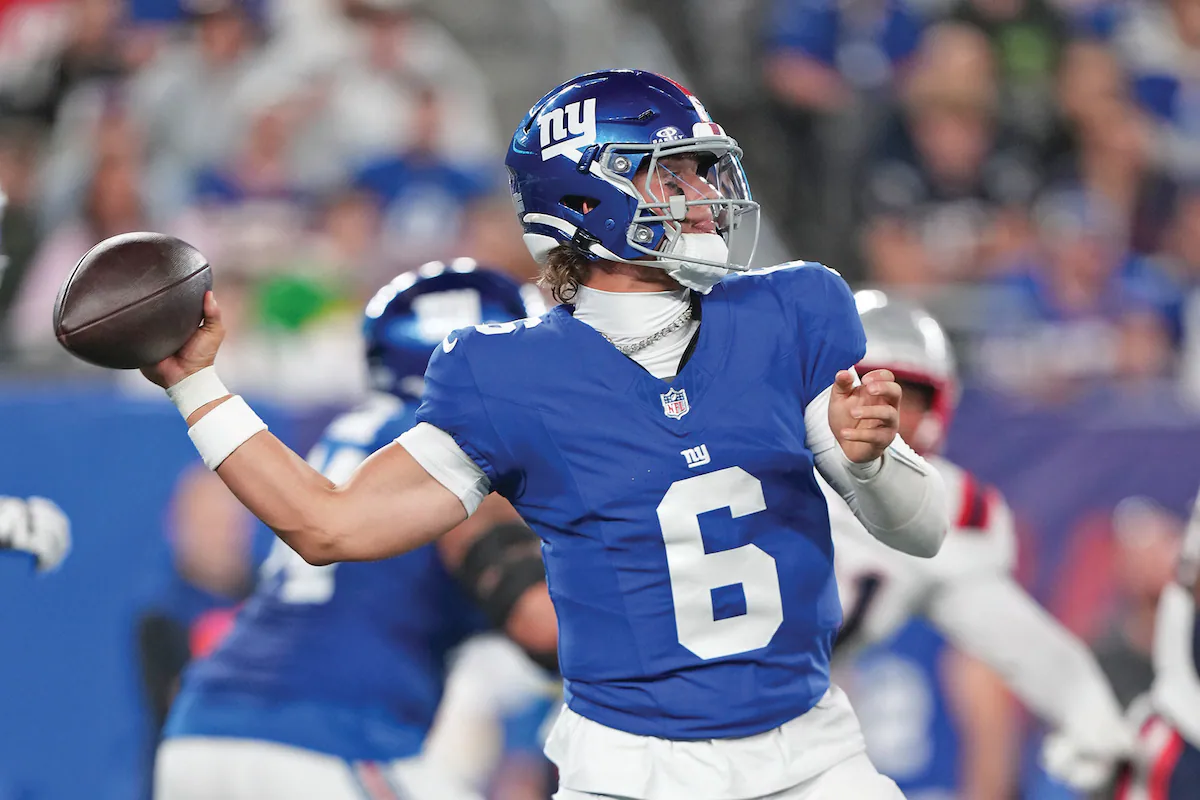
Fred Fernandes remembers a “scrawny” 14-year-old from a different school district showing up at Roy High in 2017. Fernandes immediately recognized Jaxson Dart’s talent, but the legendary Utah high school coach didn’t expect the freshman to become the starting quarterback for a program that had made four straight postseason appearances.
A senior had transferred to Roy from a rival school with the intention of stepping into the open quarterback job. It was clear to Fernandes that Dart was better, which the older quarterback didn’t readily accept.
“The older kid was threatening him physically,” said Dart’s father, Brandon. “He would push him. He would push him out of the huddle. He was always yapping and saying derogatory comments toward Jax.”
Dart didn’t back down.
“He was just like, ‘Screw you,’” Brandon said. “He was like, ‘You can say and do whatever you want, but I’m here to take your job.’”
Dart was eventually named the starter, marking the first of many times he would enter a new situation as an underdog and quickly win over coaches and (most) teammates with his uncommon leadership and relentless competitiveness.
After three years at Roy, Dart’s football journey took him to a Utah high school powerhouse for his senior year during the height of the COVID-19 pandemic. Then he went to USC for one year before the arrival of future No. 1 pick Caleb Williams forced him to transfer across the country to Ole Miss. After three record-setting seasons in the SEC, Dart landed with the New York Giants as a first-round pick in this year’s draft.
Now, sooner than he ever expected, Dart is taking over a 0-3 team with coach Brian Daboll banking on the rookie to save his job. Potential Hall of Fame quarterback Russell Wilson was benched to make way for Dart, who will face the suffocating defense of the undefeated Los Angeles Chargers in his first career start on Sunday at MetLife Stadium.
It’s a daunting scenario. But those who know Dart best expect him to rise to the occasion, just like he’s done so many times before.
“When you give him the reins, I think he’s going to take it and run with it,” said Graham Harrell, Dart’s offensive coordinator at USC. “When he steps foot on the field, he exudes confidence. He’s the type of dude who makes the people around him better. I think that’s why he’s had success everywhere he goes. He’s going to do the same thing in the NFL.”
Brandon Dart, who played safety at Utah in the 1990s, could tell early that his oldest son was different. Brandon remembers Jaxson running through the entire defense for a touchdown on the second play of his first game as a third-grader. As the touchdowns piled up, the buzz around Dart grew.
“There were a lot of people from around our town, neighbors who didn’t have kids that were even playing, just there to come watch Jaxson play because they had seen things he had done,” Brandon remembered. “I remember telling a neighbor, ‘Thanks for coming.’ And he was like, ‘Of course we had to come watch the Jaxson Dart show.’”
Dart grew up in Kaysville, Utah, a city with a population of 33,000, located 22 miles north of Salt Lake City. Davis High was Dart’s local school, but his mother, Kara, was turned off by a dismissive conversation with the football coach, who said freshmen didn’t play in his program.
The next day, Brandon Dart called Fernandes about checking out Roy High, about 13 miles away. Fernandes saw Dart throw in the spring as an eighth grader and thought, “Holy cow, this kid is something.”
Fernandes said there was “a little bit of a controversy” with the older quarterback’s family when Dart was named the starter, but the 5-foot-11, 170-pound freshman quickly won over his other teammates.
“He’d get his scrawny butt killed, and it wasn’t ever the offensive line’s fault,” Fernandes said. “It was, ‘Hey, I’ve got to get rid of it quicker. Just give me a little bit more time, and we’ll be good.’”
In Dart’s fourth start, he threw three long touchdown passes in a 49-20 win.
“Right then, I knew this kid was going to be in the NFL one day,” Fernandes said. “I’ve had a few NFL guys, but they didn’t jump off the screen at me like Jaxson did.”
Fernandes played wide receiver at Roy in the 1970s with quarterback Jim McMahon, who went on to win two Super Bowls in a 15-year NFL career.
“I told Jim, ‘I’ve got a kid that’s better than you were when you were in high school,’” Fernandes said. “Dart has a lot of Jim McMahon in him, actually, on the field. Just how he treats teammates and how he gets people following him.”
Dart delivered three successful seasons at Roy, but five offensive linemen graduated after his junior year. With five smaller linemen built for run-blocking replacing that group, Dart wasn’t going to have an opportunity to throw much as a senior.
With minimal interest from college programs at the time, Dart’s family and Fernandes mutually decided a transfer was his best option.
“When Jaxson came in to tell me, he cried for 40 minutes,” Fernandes said. “I was trying to convince him this is the right thing to do, and you’ve got to go and do what’s best for you.”
Dart moved in with his aunt 40 miles south so he could attend powerhouse Corner Canyon High as a senior. Corner Canyon was coming off a state championship, but its quarterback had graduated, and there was no one ready to take over.
That caused Corner Canyon coach Eric Kjar some stress until he watched Dart.
“I saw him do some 7-on-7 with my son in that offseason, and he had been playing really well in that, so I was like, ‘Well, this will probably work out pretty good for us,’” Kjar said.
Dart’s competitiveness opened eyes even at a championship-level program. When Corner Canyon would conduct competitive periods between the offense and defense in training camp, Kjar said Dart treated it “literally, like the Super Bowl.”
“If he didn’t win one of those periods, he was so pissed off,” Kjar said. “You could barely even talk to him after. I’d see him rip his helmet off and hit himself in the head with it. That dude has an extreme passion and love for the game and plays it that way.”
Still, the college football recruiting world was slow to recognize Dart’s potential. That changed when the COVID-19 pandemic created an opportunity.
With minimal options to fill sports programming in August 2020, ESPN broadcast Corner Canyon’s third game of the season against Bingham High. Dart completed 16-of-23 passes for 279 yards and six touchdowns, while adding 11 carries for 132 yards in a breakout performance. Recruiting interest surged after that game, while Dart maintained his focus on leading Corner Canyon to another state championship.
Dart had to adjust to a new offense with a more complex passing scheme and an emphasis on quarterback runs at Corner Canyon. Dart barely ran at Roy because Fernandes’ focus was on keeping his quarterback healthy, which was a challenge due to his aversion to sliding or running out of bounds. But Dart’s legs were unleashed at Corner Canyon, rushing for 1,195 yards to go with 4,691 yards passing to earn the Gatorade National Player of the Year award.
“He wanted contact,” said Corner Canyon teammate Jackson Powers-Johnson, who is now an offensive lineman for the Las Vegas Raiders. “He didn’t want to slide; our coach was going to kill him. He just wanted to kill people. Having a quarterback who wants to kill people just as much as you is amazing.”
Kjar unsuccessfully tried to rein in Dart’s aggressive running style.
“He will not get out of harm’s way,” Kjar said. “Good luck to (Giants coach Brian) Daboll, because I couldn’t do it.”
Dart chose to attend USC despite the Trojans already having two four-star quarterbacks in the 2021 recruiting class. Jake Garcia flipped to Miami after Dart committed to USC, but Los Angeles native Miller Moss remained as competition.
Dart wasn’t concerned with battling Miller for the No. 2 job. He had his sights set on unseating junior starter Kedon Slovis.
Dart performed so well in training camp that USC’s coaches knew they had to get him on the field. Much like the Giants did with Dart when he got in for a few snaps the past two games, the plan was to give him an occasional series. But in the first quarter of the third game of the season, Slovis suffered an injury.
Dart’s time had arrived. He threw an interception on his first drive and fumbled to end his third series. Trailing 14-0, USC was facing fourth-and-9 from Washington State’s 38-yard line late in the first half.
“He hits a post right down the middle for a touchdown,” Harrell said. “So it’s 14-7 at half, and then we go out and score 38 in the second half because he just lights it up. It was almost like he just needed that one big shot, and from there, it just took off.”
The Trojans rolled to a 45-14 win, with Dart finishing with 391 yards passing and four touchdowns. He couldn’t build on the impressive debut because he tore the meniscus in his right knee early in the first half.
“I was up in the box, so I didn’t know anything was wrong until the following day,” Harrell said. “You’ve got to respect the competitor in him. He did some real damage the second or third drive of his career and doesn’t say a word and comes out and scores 45 points on those dudes and finds a way to win for us.”
Dart missed five weeks before returning for the final five games of the season.
“I think everyone thought this kid is going to be the guy to take USC to what it should be again,” Harrell said. “That was the vision everyone there had for Jaxson.”
That vision changed when new coach Lincoln Riley arrived from Oklahoma at the end of Dart’s freshman season. Riley brought with him the decorated Williams, who was a lock to be USC’s starting quarterback for the next two years.
That forced Dart to transfer, landing across the country at Ole Miss. Of all the new beginnings for Dart, this was the biggest culture shock.
“It was a lot of us from the South, from Mississippi,” said former Ole Miss offensive lineman Eli Acker. “We were all like, ‘What is this Utah guy going to be like? He’s coming from California, so what’s he going to be like?’”
As he did everywhere, Dart quickly built relationships with his new teammates.
“He’s the type of guy who can go hang out with anybody on the team, do what anybody on the team likes to do,” said Acker, who became a hunting buddy. “He’s just a natural-born leader, so guys just naturally gravitate to him.”
The football transition wasn’t as smooth initially. Lane Kiffin’s RPO-heavy offense was a departure from the Air Raid Dart ran at USC and the spread system at Corner Canyon.
Dart competed for the starting job with Luke Altmyer, a popular Mississippi native who served as the Rebels’ backup as a freshman. A rocky performance in Ole Miss’ spring game raised doubts about Dart.
“In that culture there, where football is everything, that left a bitter taste in his mouth the whole entire summer of just hearing he’s overrated, or he doesn’t do this or he can’t do that,” Brandon Dart said. “It was probably the first time in his whole life where he kind of questioned, ‘Am I going to win this job?’”
Dart and Altmyer engaged in what Acker described as a “neck-and-neck” quarterback competition. Dart wasn’t informed he would start the season opener until 9:30 the night before.
Dart played fine in a 28-10 win over Troy, but Altmyer started the second game of the season. Altmyer suffered an injury that opened the door for Dart to seize the starting job. Dart started the final 11 games, leading Ole Miss to an 8-5 record.
After the season, Kiffin brought in Oklahoma State transfer Spencer Sanders to compete for the starting job. Dart could have transferred again. Instead, he chose to stay and fight to keep his job.
“I think that really irked Jaxson a little bit,” Brandon Dart said. “He felt disrespected. But with all the chatter of, ‘If they’re going to do that to you, then they don’t respect you, and you can leave.’ I think he said, ‘F-that. This is my team. This is my locker room. Spencer is coming into my world, and I’m going to make his life a living hell.’”
Dart started every game over his final two seasons at Ole Miss, breaking the school’s career record for passing yards that was held by Eli Manning. Dart’s 28 career wins also set the Ole Miss record for a quarterback.
Dart wasn’t viewed as a slam-dunk first-round NFL Draft pick, and he wasn’t considered at No. 3 when the Giants selected Penn State linebacker Abdul Carter. But as the pre-draft process advanced, Dart repeated his habit of winning over coaches.
Daboll was enamored with Dart, believing he had finally found the player with the physical tools and personality to run his offense when the Giants traded up to take the quarterback with the 25th pick. So, it’s no surprise Daboll swiftly pulled the plug on Wilson and turned over the team to the 22-year-old Dart.
“I want to do my best to be a spark,” Dart said this week. “I want to create excitement on the field. I want to be explosive when opportunities are there. Try to just bring a little bit of swagger.”
It’s a given that Dart will be amped up on Sunday in a way that Giants fans aren’t accustomed to seeing from their quarterback.
“He’ll be head-butting people and all sorts of stuff,” Harrell said. “He’s going to have crazy energy when he walks out on the field.”
That’s the only way Dart knows how to play.
“When he crosses the lines, it’s almost like he morphs into a different human being,” Brandon Dart said. “It’s like he’s a thoroughbred horse getting into the gate. He is just so internally amped up that winning, competing, playing well — that’s what he’s all about.”
Dart has been building toward this moment his entire life. He’s been prepared by conquering every step along the way. Now he’s ready to seize the dream he’s chased for so long.
“I’m just going to lay everything I have on the line,” Dart said. “That’s just the way that I play the game. When I step in between those lines, nothing else in the world matters to me except doing everything that I can to win it.”



